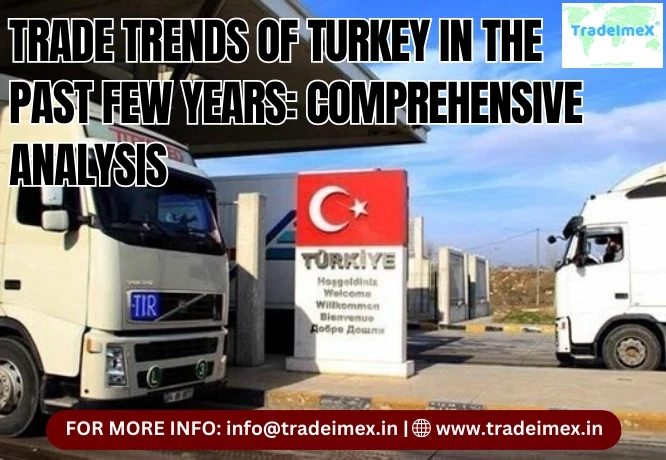INTRODUCTION
Turkey, a transcontinental country straddling Europe and Asia, has long been a pivotal player in global trade due to its strategic location, diverse economy, and historical significance. Over the past few years, Turkey's trade landscape has undergone significant transformations, shaped by both domestic policies and global market dynamics. In this blog post, we will delve into the key trade trends that have shaped Turkey's economic trajectory and its implications for the future.
ECONOMIC DIVERSIFICATION
As of late, Turkey has put forth deliberate attempts to differentiate its economy past customary areas like agribusiness and materials. This shift is clear in its exchange designs, where the nation has seen a significant expansion in commodities of higher worth-added merchandise like car items, and hardware. This essential move towards additional mechanically progressed businesses has supported trade incomes as well as upgraded the country's worldwide seriousness.
TRADE WITH THE EUROPEAN UNION
The European Union (EU) remains Turkey's largest trading partner, with most of its exports destined for EU member countries. The Customs Union agreement, which came into effect in 1996, has facilitated smooth trade relations by eliminating tariffs and trade barriers for most goods. Despite political tensions and occasional disputes, this trade partnership has continued to grow, contributing significantly to Turkey's economic stability, and finally boosting Turkey Trade Data reports.
SHIFT IN EXPORT DESTINATIONS
While the EU remains a crucial trade partner, Turkey has been proactively expanding its export markets to reduce dependency on a single region. The Middle East, North Africa, and Central Asian countries have become increasingly important destinations for Turkish exports. This diversification of export markets acts as a buffer against economic downturns in any single region, enhancing Turkey's resilience in the face of global uncertainties.
ENERGY TRADE AND GEOPOLITICAL CONSIDERATIONS
Turkey's strategic position at the crossroads of Europe and Asia has also made it a key player in energy trade. Its demand for energy resources, particularly natural gas, and oil, has led to the establishment of important energy corridors and infrastructure projects. The completion of projects like the Trans-Anatolian Natural Gas Pipeline (TANAP) has positioned Turkey as an energy hub, further enhancing its geopolitical importance.
DIGITALIZATION AND E-COMMERCE
The advanced upset has not left Turkey immaculate. The nation has seen a flood in web-based business exercises, both locally and universally. With a youthful and well-informed populace, online retail has picked up speed, introducing new open doors for nearby organizations to take advantage of worldwide business sectors that in turn take Turkey Import Data statistics to the next level. In any case, this pattern likewise presents difficulties connected with planned operations, crossline guidelines, and information protection, which require cautious consideration.
CONCLUSION
The past few years have witnessed Turkey's emergence as a dynamic player in global trade, characterized by economic diversification, strategic partnerships, and a growing role in energy and digitalization. As the country continues to navigate both domestic and international challenges, its ability to capitalize on emerging opportunities will be crucial in shaping its trade trajectory in the years to come.
By fostering innovation, nurturing trade relationships, and implementing prudent economic policies, Turkey has the potential to not only strengthen its position on the global stage but also contribute significantly to regional and global economic development. This becomes easy when a trader learns more about Turkey’s trade patterns with the help of its Turkey trade statistics that are provided by TradeImeX which is the best trade data provider online.
Source URL: https://www.atoallinks.com/2023/trade-trends-of-turkey-in-the-past-few-years/


